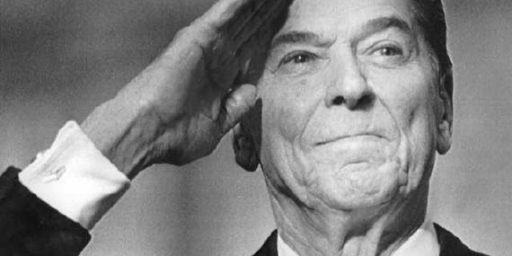WHATEVER IT TAKES
David Brooks is both bemused and admiring of the Bush team:
The Bush administration has the most infuriating way of changing its mind. The leading Bushies almost never admit serious mistakes. They never acknowledge that they are listening to their critics. They never even admit they are shifting course. They don these facial expressions suggesting calm omniscience while down below their legs are doing the fox trot in six different directions.
Sunday night’s presidential speech was a perfect example. The policy ideas Bush sketched out represent such a striking series of policy shifts they amount to a virtual relaunching of the efforts to rebuild Iraq. Yet the president unveiled them as if they were stately extensions of the policies that commenced on Sept. 11, 2001.
Fortunately, while in public members of the administration emphasize their own incredible foresight, in private they are able to face unpleasant facts and pivot in response. Sometime around the middle of August, while the president was on the ranch, members of the Bush team must have done a candid and scathing review of how things were going in Iraq.
<...>
Some close advisers suspect the violence may not abate in Iraq until early next year, and it will be interesting to see whether Americans can sustain their morale over that time. Still, as Bush makes these pivots, I’m reminded of the way Ronald Reagan made his amazing policy shifts at the end of the cold war, some of which outraged liberals (Reykjavik) and some of which outraged conservatives (the arms control treaties with Mikhail Gorbachev). Presidents tend to be ruthless opportunists, no matter how ideological they appear. Even as he announced his strategy on Sunday night, Bush left open the possibility that he might be compelled to shift again and send in more U.S. troops if circumstances warrant.
The essential news is that Bush will do whatever it takes to prevail, and senior members of his administration are capable of looking honestly at their mistakes. You will just never be able to get any of them to admit publicly they’ve ever made any.
Heh.
I certainly prefer the willingness to adjust policies to reality to blind ideology. In the case of Reagan, the facts on the ground simply changed: Gorby was a different kind of Soviet leader than Brezhnev. Once it became apparent that Gorby was genuinely interested in change, Reagan took a radically different course. And, I might add, Reagan’s initial hard core stance helped make Perestroika and the eventual collapse of the Soviet Union occur sooner than it otherwise would have.
In the present circumstance, Bush administration policy worked quite well in the initial military phase but has been a decidedly mixed bag in the post-war phase. The degree to which they’ve made mistakes is simply unclear because we don’t have a counterfactual with which to make comparisons. Would things be going more smoothly had we introduced another infantry division immediately after the ground phase ended? Maybe. Or maybe they’d have gotten in the way. Would it have been useful to have the U.N. involved from the beginning? Almost certainly. But it is not entirely clear to me how that was going to happen, given the recalcitrance of France, Germany, and Russia. The bombing of the U.N. headquarters in Iraq created a new environment that allowed another shot at getting them involved; it’s perfectly reasonable to pursue it.





